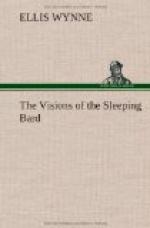Wynne, Ellis, s. Edw. of Lasypeys, co. Merioneth, pleb. Jesus Coll. matric. 1st March 1691-2, aged 21; rector of Llandanwg, 1705, & of Llanfair-juxta-Harlech (both) co. Merioneth, 1711. (Vide Foster’s Index Eccles.)
Probably his stay at the University was brief, and that he left without taking his degree, for I have been unable to find anything further recorded of his academic career. {0a} The Rev. Edmund Prys, Vicar of Clynnog-Fawr, in a prefatory englyn to Ellis Wynne’s translation of the “Holy Living” says that “in order to enrich his own, he had ventured upon the study of three other tongues.” This fact, together with much that appears in the Visions, justifies the conclusion that his scholarly attainments were of no mean order. But how and where he spent the first thirty years of his life, with the possible exception of a period at Oxford, is quite unknown, the most probable surmise being that they were spent in the enjoyment of a simple rural life, and in the pursuit of his studies, of whatever nature they may have been.
According to Rowlands’s Cambrian Bibliography his first venture into the fields of literature was a small volume entitled, Help i ddarllen yr Yscrythur Gyssegr-Lan ("Aids to reading Holy Writ"), being a translation of the Whole Duty of Man “by E. W., a clergyman of the Church of England,” published at Shrewsbury in 1700. But as Ellis Wynne was not ordained until 1704, this work must be ascribed to some other author who, both as to name and calling, answered to the description on the title-page quoted above. But in 1701 an accredited work of his appeared, namely, a translation into Welsh of Jeremy Taylor’s Rules and Exercises of Holy Living, a 12mo. volume published in London. It was dedicated to the Rev. Humphrey Humphreys, D.D., Bishop of Bangor, who was a native of the same district of Merionethshire as Ellis Wynne, and, as is shown in the genealogical table hereto {0}, was connected by marriage with his family.
In 1702 {0b} he was married to Lowri Llwyd—anglice, Laura Lloyd—of Hafod-lwyfog, Beddgelert, and had issue by her, two daughters and three sons; one of the daughters, Catherine, died young, and the second son, Ellis, predeceased his father by two years. {0c} His eldest son, Gwilym, became rector of Llanaber, near Barmouth, and inherited his ancestral home; his youngest son, Edward, also entered the Church and became rector of Dolbenmaen and Penmorfa, Carnarvonshire. Edward Wynne’s son was the rector of Llanferres, Denbighshire, and his son again was the Rev. John Wynne, of Llandrillo in Edeyrnion, who died only a few years ago.
The following year (1703), he published the present work—his magnum opus—which has secured him a place among the greatest names in Welsh Literature. It will be noticed that on the title-page to the first edition the words “Y Rhann Gyntaf” ("The First Part”) appear; the explanation given of this is that Ellis Wynne did actually write a second part, entitled, The Vision of Heaven, but that on hearing that he was charged with plagiarism in respect of his other Visions, he threw the manuscript into the fire, and so destroyed what, judging from the title, might have proved a greater success than the first part, as affording scope for lighter and more pleasing flights of the imagination.




